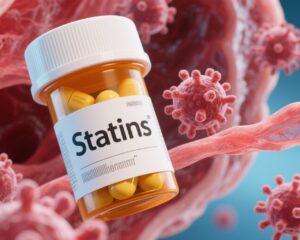Highlight
- Obinutuzumab combined with lenalidomide demonstrated a 2-year progression-free survival (PFS) rate of 93.3% in untreated high tumor burden follicular lymphoma (FL).
- The complete response (CR) rate at 30 months reached 89.7%, indicating deep and durable remissions.
- The safety profile was manageable with mostly grade 1-2 adverse events; grade ≥3 neutropenia and rash were the most frequent serious toxicities.
- This chemo-free regimen harnesses enhanced antibody-dependent mechanisms and immunomodulation, representing a promising therapeutic approach for frontline FL treatment.
Study Background and Disease Burden
Follicular lymphoma (FL) is a common indolent non-Hodgkin lymphoma (NHL) subtype, affecting a significant patient population worldwide. It is characterized by high response rates to initial therapy but is generally considered incurable, with multiple relapses over a prolonged clinical course.
Management of advanced-stage, high tumor burden FL remains challenging, with existing frontline regimens including chemoimmunotherapy and emerging chemo-free options. Despite effective initial responses, relapses contribute to morbidity and therapeutic resistance, underscoring an unmet need for durable, well-tolerated, and novel frontline treatments.
Lenalidomide, an immunomodulatory drug enhancing T-cell and natural killer cell function, in combination with the anti-CD20 antibody rituximab, has established clinical benefit by synergizing immune-mediated tumor cytotoxicity. Obinutuzumab is a newer glycoengineered anti-CD20 monoclonal antibody with enhanced antibody-dependent cellular cytotoxicity (ADCC), potentially improving efficacy beyond rituximab.
Thus, combining obinutuzumab with lenalidomide offers a rational strategy to maximize immune-mediated tumor control.
Study Design
This single-center, open-label phase 2 clinical trial (NCT02871219) enrolled 90 participants with previously untreated FL demonstrating high tumor burden per the Groupe d’Étude des Lymphomes Folliculaires (GELF) criteria. Eligibility included histologically confirmed FL grade 1 to 3a, stage II-IV disease, Eastern Cooperative Oncology Group (ECOG) performance status ≤ 2, and adequate organ function.
The intervention consisted of 6 cycles of induction therapy combining obinutuzumab with lenalidomide, followed by a maintenance phase of lenalidomide and obinutuzumab administered over 24 cycles. Treatment dosing and schedules adhered to established safety parameters.
Primary outcome was the 2-year progression-free survival (PFS). Secondary endpoints included complete response (CR) rate measured by standardized imaging response criteria and toxicity assessment per Common Terminology Criteria for Adverse Events (CTCAE).
Key Findings
With a median follow-up period exceeding 70 months, the study reported an impressive 2-year PFS of 93.3% (95% confidence interval [CI], 88.2-98.6), with median PFS not reached, reflecting sustained disease control.
The complete response rate at 30 months was 89.7% (95% CI, 81.3-95.2), indicating high rates of deep remission. No new safety signals emerged during extended follow-up.
Adverse events (AEs) were predominantly manageable. The most common any-grade AEs included diarrhea (61.1%), maculopapular rash (53.3%), and fatigue (52.2%). Treatment-related grade ≥3 AEs were neutropenia (18.9%), maculopapular rash (11.1%), and pneumonia (6.7%). These toxicity rates are consistent with expected profiles of immunomodulatory regimens and did not lead to excessive discontinuation.
The regimen’s safety, coupled with its efficacy, supports its feasibility and tolerability for frontline high tumor burden FL patients.
Expert Commentary
The combination of obinutuzumab and lenalidomide represents a paradigm shift in frontline FL therapy by leveraging enhanced ADCC and immunomodulation without conventional chemotherapy.
Compared to historical data with rituximab-lenalidomide, obinutuzumab’s engineered Fc region augments effector cell engagement, likely contributing to higher CR and PFS rates observed. The durable remissions at a median 6-year follow-up are particularly encouraging given FL’s traditionally relapsing nature.
Nonetheless, as a single-center phase 2 trial, generalizability requires confirmation in larger, multi-center randomized studies.
Additionally, longer-term safety data and quality-of-life assessments will be valuable in defining this regimen’s role versus existing standards such as chemoimmunotherapy or emerging targeted therapies.
Mechanistically, the dual immune mechanisms—direct tumor cell targeting by obinutuzumab and immune activation by lenalidomide—may synergize to produce robust tumor control. Such chemo-free strategies are increasingly attractive for patients seeking treatments with less toxicity.
Current guidelines recognize immunomodulatory-antibody combinations as valid options, and this study strengthens the evidence base supporting obinutuzumab-lenalidomide as a promising frontline regimen.
Conclusion
This phase 2 study demonstrates that obinutuzumab combined with lenalidomide is an effective and safe frontline therapy in previously untreated high tumor burden follicular lymphoma, providing robust complete responses and excellent progression-free survival over prolonged follow-up.
The favorable toxicity profile combined with durable efficacy supports this regimen as a valuable chemotherapy-free option, advancing personalized treatment approaches in FL.
Further confirmatory randomized trials and real-world outcome data will help establish its definitive role in clinical practice and may inform guidelines for frontline management.
References
1. Akkad N, Feng L, Westin JR, et al. A phase 2 study of obinutuzumab combined with lenalidomide in previously untreated high tumor burden follicular lymphoma. Blood Adv. 2025;9(17):4396-4404. doi:10.1182/bloodadvances.2025016483.
2. Casulo C, Byrtek M, Dawson KL, et al. Early relapse of follicular lymphoma after rituximab plus CHOP defines patients at high risk for death: An analysis from the National LymphoCare Study. J Clin Oncol. 2015;33(23):2516-2522. doi:10.1200/JCO.2014.58.7742.
3. Jurczak W, Zinzani PL, Gaidano G, et al. Obinutuzumab or rituximab plus chemotherapy for first-line follicular lymphoma. N Engl J Med. 2018;378(23):2219-2230. doi:10.1056/NEJMoa1807315.
4. Leonard JP, Trneny M, Izutsu K, et al. AUGMENT: A phase III study of lenalidomide plus rituximab versus placebo plus rituximab in relapsed or refractory indolent lymphoma. J Clin Oncol. 2019;37(14):1188-1199. doi:10.1200/JCO.18.01489.



